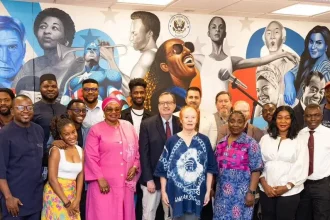Former Chief of Army Staff, General Abdulrahman Dambazau (rtd), has attributed Nigeria’s deepening security crisis to a breakdown of national cohesion, poor governance, corruption, and inadequate coordination among security agencies.
Speaking in Abuja on Tuesday while delivering a keynote address titled “Nigeria’s Security Challenges and the Quest for National Cohesion: A New Paradigm for Internal Security Architecture and Governance” at the seventh annual public lecture of the Just Friends Club of Nigeria (JFCN), Dambazau said the country’s security framework requires urgent recalibration to tackle emerging threats.
The former Minister of Interior (2015–2019) lamented that Nigeria is grappling with complex and evolving security problems that demand a more adaptive and people-centered approach.
He identified the major threats to life and property as the activities of Boko Haram insurgents, bandits, IPOB members, Yoruba Nation agitators, kidnappers, militants, urban gangs, and other violent groups involved in armed robbery, murder, and ritual killings.
According to him, these violent actors have instilled fear across homes, markets, places of worship, and farmlands. He said, “Freedom from fear has been eroded by the violent, non-state actors.”
Dambazau added that beyond physical insecurity, the country is facing major human security challenges, including poverty, unemployment, hunger, disease, and illiteracy, which he said have deprived many Nigerians of their “freedom from want.” He noted that Nigeria continues to rank low in the UN Human Development Index, and warned that advances in information and communication technology have also created new forms of security threats.
He pointed out that porous borders, regional instability, and the proliferation of illicit arms have worsened the situation. “The widespread availability of unregistered and unmarked weapons has fuelled insurgency, banditry, armed robbery and general insecurity across the country,” he observed.
The retired general stressed that insecurity cannot be resolved through force alone. “We can’t shoot our way out of insecurity. Bullets and boots alone won’t solve problems rooted in poverty, unemployment, and exclusion. Real security is people-centred — it is about freedom from fear and freedom from want,” he said.
He further explained that the roots of banditry lie in socio-economic deprivation and weak local governance. “The military has been overstretched because the police, who should handle internal security, are underdeveloped and politicised,” he noted.
Dambazau also faulted the increasing deployment of soldiers for regular policing duties. “The military is now everywhere doing roadblocks and checkpoints. That’s not their job. Meanwhile, governors keep building roads but neglect education and healthcare, which are the real foundations of human security,” he said.
The former army chief maintained that the lack of national cohesion has deepened insecurity and complicated efforts to find collective solutions. “It is a known fact that terrorists, secessionists, militants, bandits, and insurgents attack individuals and communities regardless of their faith or ethnicity,” he stated.
He argued that the absence of unity in tackling the country’s security challenges has made conflicts like the herder-farmer crisis more difficult to resolve. “Rather than joining hands to confront the root causes of these conflicts, we have turned them into indigene-settler and ethno-religious conflicts,” he added.
Dambazau further warned that this internal disunity has emboldened foreign powers. He cited recent threats by the United States to intervene militarily in Nigeria, questioning the U.S. government’s motives. “America protects its own interests, not anyone else’s. Nigeria must define and defend her own interests. In the more than 10 years of US presence in Niger, where it maintained two military bases, what did the US do to prevent the growth of security challenges?” he asked.
He continued, “It is also on record that at the initial second coming of the Trump administration, US congressmen accused USAID of terrorism financing in Africa. I think the US is looking for an opportunity to establish an alternative base in Nigeria… Unfortunately, they have willing partners in Nigeria.”
Dambazau also criticised both the executive and legislative arms for politicising and mismanaging defence budgeting. “Many items in the defence budget are contractor-driven and inserted by lawmakers without consulting the services. Sometimes, the items are irrelevant to operational needs,” he said.
He called for a review of the National Security Strategy signed under former President Muhammadu Buhari, insisting that sustainable security requires investing in citizens as much as in the armed forces. “Investment in the military alone will never solve Nigeria’s problem if we do not invest in people,” he stated.
In his remarks, Professor Tonnie Iredia, former Director-General of the Nigerian Television Authority (NTA), who chaired the event, expressed concern over the worsening insecurity and the lack of political will to address it.
Similarly, Professor Okey Ikechukwu, a Strategic Management expert at Nnamdi Azikiwe University, lamented the growing disconnect between government and citizens, which he said has weakened intelligence gathering.
Also speaking, Air Vice Marshal Gbolahan Adekunle (rtd), former Chief of Policy and Plans at the Nigerian Air Force, decried the demoralisation of security personnel and wastage of resources due to premature retirements.
Earlier, Fred Ohwahwa, President of the Just Friends Club of Nigeria (JFCN), expressed concern over recent threats by U.S. President Donald Trump to invade Nigeria, urging Nigerians to confront insecurity collectively to prevent any form of foreign interference.










